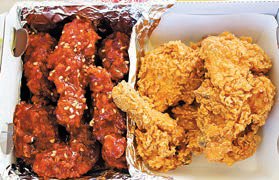‘KFC’ now stands for Korean Fried Chicken
For Korean food YouTubers, both local and international, Korean fried chicken is a guaranteed way to get views. It’s even been said that whenever you’re experiencing a downturn in views or subscriber growth, you can use Korean fried chicken as a cheat. The popularity of Korean fried chicken has even changed the meaning of the acronym KFC, which stands for Kentucky Fried Chicken. It’s now an acronym for Korean Fried Chicken.
The enthusiasm for Korean fried chicken is also evident in a Korean food consumer survey conducted by the Ministry of Agriculture, Food and Rural Affairs in 2021 among 8,500 locals in 16 major overseas cities. According to the survey, Korean fried chicken (16.1%) was the most preferred Korean food among those with experience in Korean cuisine. In fact, Korean-style chicken is one of the top foods that foreigners list as a must-try in Korea.
Buoyed by these gains, Korean chicken brands are accelerating their overseas expansion. One of the most aggressive is BBQ. It was the first Korean chicken brand to enter the U.S. and now has more than 200 restaurants. BBQ aims to “catch up with McDonald’s,” the world’s No. 1 franchisor, and other companies such as Kyochon and BHC are following suit.
Kimchi exports in 2021 up 80% from 2016

Kimchi exports in particular have increased significantly since the COVID-19 pandemic, as studies have shown its immune-boosting properties. In a study correlating the number of COVID-19 deaths with regional dietary differences, researchers led by Professor Emeritus Jean Bousquet of the University of Montpellier in France found that countries with a high consumption of fermented cabbage had fewer deaths. Dr. Bousquet is a respiratory and allergy expert who has served as president of the Global Alliance Against Chronic Respiratory Disease (GARD).
Kimchi’s rise to prominence is also due to the efforts of domestic companies. Daejeon’s Jongga, which accounts for 43% of all kimchi exports, built a kimchi factory in the United States in 2022. The factory, located in the City of Industry (CA) near Los Angeles (LA), covers an area of 10,000 square meters. It produces not only cabbage kimchi, but also vegan kimchi, white kimchi, beet kimchi, pickled radish, flavored kimchi, and cabbage kimchi that reflect American food culture. Lee Seok-ho, deputy head of the public relations team at Target, said, “We are constantly researching localization while sticking to the tradition of kimchi. We plan to introduce many new and diverse kimchi products.”
BY HWANG JUNG-OK AND AHN HYE-JIN [ok76@joongang.co.kr]






